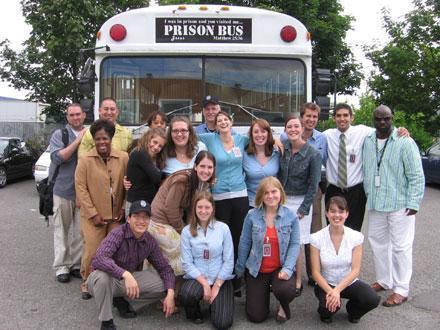A White Center View - Prison bus visits
'PRISON BUS.' The "crew" of the bus spends two weeks observing the work of the state Department of Corrections and spending time with both offenders and corrections officers. Photo by David Preston.
Tue, 07/31/2007
Some Christians prefer to preach. Some would rather practice. With its "Here's Life Inner City" program, the Campus Crusade for Christ ministry calls upon its college student interns to do both.
Spotting the group's "Prison Bus" parked at the Westwood Christian Assembly church in White Center recently, I tapped on the door and soon found myself talking with program director, Tom Durrant, and Joseph Yasso, one of the student interns, about how it works.
Durrant described the program as a month-long "urban immersion" experience. The program gives students two weeks of exposure to the workings of the Washington State Department of Corrections, where they spend time with both offenders and community corrections officers. Students also interact with homeless people on the streets of Seattle for a week and spend a week doing various kinds of community service around Seattle. Participants come from around the country and must raise $2,300 on their own money to offset the cost of the program.
"Students come in (to the prison system) with the perception that, 'Oh this is going to be a mean prison,'" Durrant said, "but when they get in there, they're shaking hands, interacting with the offenders. Sure, these folks have made some very serious offences but nonetheless, they're people."
"Do the students evangelize?" I asked him. "Yes," he said. "But it's not a matter of going out and yelling something at somebody and then running away. It's a matter of helping somebody with real and specific needs. The students talk to the inmates about their experience with Christianity because it's changed their lives. But it's not like they're preaching to people in a giant auditorium."
Yasso, 22, and a recent graduate of Michigan State University, told me about his experience talking with men living in a Department of Corrections-run "therapeutic community", (a drug rehabilitation-based alternative to incarceration).
"Some of [the offenders] are going to be thinking, 'I'm just here to do my time and get out,' but there are others who are going to recognize that they have a problem. It's really humbling to see someone with that much life experience come back and say, 'I can't do this on my own. I need help'."
"Ninety-seven percent of the people incarcerated in Washington state today will be released at some point," Yasso explained, "so the chance of coming into contact with an ex-offender is probably pretty high. We just don't realize it. That's why the career and life skills programs in the prisons are so important."
As part of their exposure to homelessness students undergo a mock eviction exercise. They also spend some of their month on the streets talking to, and hanging out with, homeless people.
"When we did the inner city work, the first day Tom had us do a scavenger hunt to get acquainted with the city and to get us into the mindset of a homeless person," Yasso told me. "One of the goals was to find a hundred aluminum cans... and we realized pretty quickly that there were no cans on the street!"
"Then we had to try and get a free lunch. We were instructed not to go to any missions because we could've walked in there and easily gotten a free lunch. We started asking around at 10:30 in the morning but we didn't eat until 3. [The restaurant owners] all said 'Come back after the lunch rush and maybe we'll have some free bread.'"
I asked Yasso to sum up his experience with people on the street.
"Before, if I saw someone on the street I would just look away, not make eye contact," he said. "But now, I'm changed. If I see someone on the street I'm gonna look at them."
"What about panhandlers?" I asked him.
"Panhandlers? I might buy them a meal, but would lean away from giving them cash. I'll still look them in the eye though."
"What about people with drug addictions or mental illness?" I said.
"It's really hard to share God's love with someone who's mentally ill or high on something. You can't do much more than to love that person and be an example of God's love. Not judging them, but just asking them: 'Can I help take care of your immediate needs?' They need to sober up; they need to get fed; they need to get clothed... At the same time though, we talk to them about God's forgiveness."
In spite of his month 'in prison' and 'on the street', Yasso has managed to keep from becoming too hardened himself.
"Can I ask you a favor?" he said at the end of our discussion. "If you quote me, can you please call me 'Joseph', and not 'Joe'? My mom might read the article and she'll say, 'I named my son Joseph. I didn't name him 'Joe'."
You can find out more about the "Here's Life Inner City" program from Tom Durrant at 253-630-1990 or via e-mail at Thomas.Durrant@ccci.org.
David Preston is a White Center-based free-lance journalist. You can reach him at Preston.David@comcast.net


